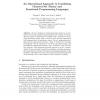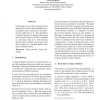99 search results - page 2 / 20 » Extending Classical Theorem Proving for the Semantic Web |
TLCA
2009
Springer
13 years 11 months ago
2009
Springer
G¨odel’s completeness theorem is concerned with provability, while Girard’s theorem in ludics (as well as full completeness theorems in game semantics) are concerned with proo...
TACS
1994
Springer
13 years 9 months ago
1994
Springer
Abstract. We have designed a programming logic based on an integration of functional programming languages with classical set theory. The logic merges a classical view of equality ...
SEMWEB
2007
Springer
13 years 11 months ago
2007
Springer
Classical ontologies are not suitable to represent imprecise nor uncertain pieces of information. As a solution we will combine fuzzy Description Logics with a possibilistic layer....
EUSFLAT
2003
13 years 6 months ago
2003
In this paper we prove that a transitive fuzzy relation R on a set X can be extended to a total transitive fuzzy relation Q on X preserving the irreflexivity of R. This generaliz...
SYNTHESE
2008
13 years 4 months ago
2008
The Interpolation Theorem, first formulated and proved by W. Craig fifty years ago for predicate logic, has been extended to many other logical frameworks and is being applied in s...


